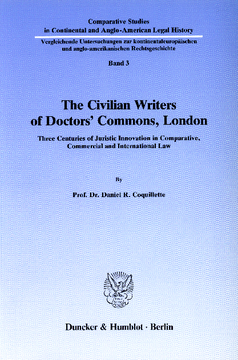
BOOK
Cite BOOK
Style
Coquillette, D. (1988). The Civilian Writers of Doctors' Commons, London. Three Centuries of Juristic Innovation in Comparative, Commercial and International Law. Duncker & Humblot. https://doi.org/10.3790/978-3-428-46177-6
Coquillette, Daniel R.. The Civilian Writers of Doctors' Commons, London: Three Centuries of Juristic Innovation in Comparative, Commercial and International Law. Duncker & Humblot, 1988. Book. https://doi.org/10.3790/978-3-428-46177-6
Coquillette, D (1988): The Civilian Writers of Doctors' Commons, London: Three Centuries of Juristic Innovation in Comparative, Commercial and International Law, Duncker & Humblot, [online] https://doi.org/10.3790/978-3-428-46177-6
Format
The Civilian Writers of Doctors' Commons, London
Three Centuries of Juristic Innovation in Comparative, Commercial and International Law
Comparative Studies in Continental and Anglo-American Legal History, Vol. 3
(1988)
Additional Information
Book Details
Pricing
Table of Contents
| Section Title | Page | Action | Price |
|---|---|---|---|
| PART I: The Early English Civilian Writers (1523–1607)* | 15 | ||
| I . Introduction | 15 | ||
| II. The English Civilians | 22 | ||
| A. The Institutional and Educational Setting: Doctors' Commons and the Ancient Universities | 22 | ||
| B. The English Civilians as Specialist Legal Practitioners: The „Civilian Monopolies“ | 29 | ||
| C. The English Civilians as Jurists: The „Bartolist Cause“ | 32 | ||
| 1. The Proper Source of Law: The Ius Gentium and Ius Naturale | 32 | ||
| 2. The Aequitas Mercatoria and Conflict of Law Doctrine | 34 | ||
| 3. The Ius Inter Gentes: Public International Law | 35 | ||
| 4. The Ratio Scripta and the Flaws of the Common Law | 37 | ||
| 5. Relations with the Crown: Quod Principi Placuit | 39 | ||
| 6. Bartolism The English civilians were much aware of continental | 41 | ||
| III. The English Civilian Writers (1523–1607) | 44 | ||
| A. The Importance of the English Civilian Literature | 44 | ||
| B. The First Advocates: The Early Civilian Writers | 46 | ||
| 1. The Doctor and Student: Christopher St. German (1457–1539) | 48 | ||
| 2. The English Humanist: Sir Thomas Smith D.C.L. (1513–1577) | 58 | ||
| 3. The Refugee: Alberico Gentili D.C.L. (1552–1608) | 63 | ||
| 4. The „Bartolist Bee“: William Fulbecke D.C.L. [claimed] (1560–1603) | 71 | ||
| 5. The „Interpreter“. John Cowell LL.D. (1554–1611) | 79 | ||
| IV. Conclusion: The Contribution of the Early Civilian Writers | 94 | ||
| PART II: The Literary Battle for the Law Merchant in England (1607–1676)* | 97 | ||
| I . Introduction: „Doctors and Students“ | 97 | ||
| II. Sir Thomas Ridley D.C.L. (c. 1549–1629) and the New Civilian Specialization | 101 | ||
| A. The Struggles for Jurisdiction | 103 | ||
| 1. Sir Julius Caesar D.C.L. (1558–1636) and the Court of Requests | 104 | ||
| 2. The Attacks on the Admiralty | 106 | ||
| B. Ridley's Response | 115 | ||
| 1. Ridley and the Jurisdictional Struggles | 116 | ||
| 2. Ridley and the „Incorporation“ of the Law Merchant | 119 | ||
| III. Charles Molloy and the Professionalization of Law Merchant Jurisprudence (1607–1690) | 124 | ||
| A. The Origins of Law Merchant Jurisprudence in England | 124 | ||
| B. Ridley's Contribution, and Its Contrast with the Common Lawyers | 129 | ||
| C. Gerard Malynes (1586–1641) and His Followers | 133 | ||
| D. Charles Molloy (1646–1690) and His Treatise | 140 | ||
| IV. Conclusion: The Dialectic | 147 | ||
| PART III: The Post-Restoration English Civilians and the Nature of Their Influence on Modern Commercial Law (1653–1787)* | 149 | ||
| I. The Myth and Reality of Doctrinal Incorporation: Herein of the „Reception“ and „Law Merchant"“Controversies | 149 | ||
| II. Interregnum – The Ideology Asserted (1650–1656) | 158 | ||
| A. The „Feathers of Doctor Duck“: Arthur Duck D.C.L. (1580–1648) and his De Usu (published 1653) | 161 | ||
| B. Sir Robert Wiseman D. C. L. (1613–1684) and his The Law of Lawes (1656) | 166 | ||
| C. Richard Zouche D. C. L. (1590–1662): The Civilian „Dove“ and his „System“ | 174 | ||
| III. Restoration – The Jurisdiction Asserted (1661–1670) | 180 | ||
| A. Zouche's Faithful Disciple: John Exton LL.D. (1600–1668) | 182 | ||
| B. John Godolphin D. C. L. (1617–1678) – A Puritan Civilian | 186 | ||
| C. The Final Champion: Sir Leoline Jenkins LL.D. (1623–1685) | 189 | ||
| IV. The Post-Revolution Retreat into Specialty and Scholarship (1688–1735) | 198 | ||
| A. A New Institute: Thomas Wood D.C.L. (1661–1722) | 198 | ||
| B. Domat Imported: William Strahan LL. D.'s Great Translation (1722) | 203 | ||
| C. John Ayliffe LL. D [deprived] (1676–1732) - The Eccentric, Pistol-Whipping, Whig Pandectist | 209 | ||
| D. Conclusion – „The Fourth Generation“ | 214 | ||
| V. The Nature of Civilian Influence on Modern Anglo-American Commercial Law | 215 | ||
| A. Bills of Exchange: A Mercantile Speciality | 217 | ||
| 1. Problems in Practice Associated with Bills of Exchange | 221 | ||
| 2. The Early Legal Experience with Bills of Exchange in England | 228 | ||
| 3. The English Civilian Approach to Bills of Exchange as a Matter of Doctrine | 249 | ||
| B. Some Peculiar Debts and Debtors | 255 | ||
| 1. Some Early Controversial Examples of Civilian Influence on Common Law Jurisprudence: Bacon, Hobbes, Seiden and Hale | 257 | ||
| 2. Debtors of a Different Stripe: Holt and Mansfield | 268 | ||
| VI. Conclusion: „Reception“ and „Incorporation“ | 296 |
